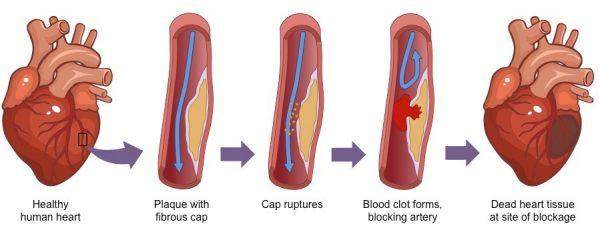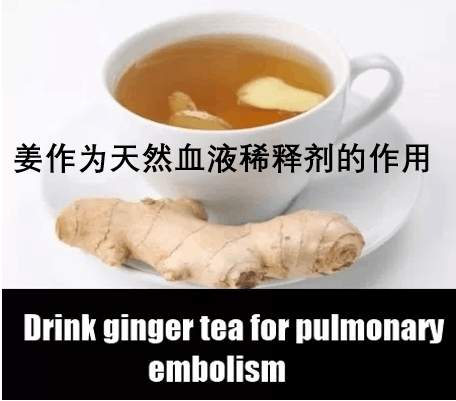生姜是天然的血液稀释剂
高黏血症是以血液粘稠度增高为主要表现的病理综合征。对于“三高”而言,高血黏度是引发高血脂、高血压、高血糖的首要因素。血液粘稠度增高后,血液阻力加大、流动缓慢,这是导致高血压、高血脂的直接原因之一,而高血粘度又会引发肾上腺素激增,从而使胰岛素的量下降,出现血糖升高。可以毫不夸张的说,高血黏是引发脑梗心梗的“罪魁祸首”。对于心脑血管的健康而言,保持适当的血压、血糖、血脂无疑是重要的,可是从某种意义上说,保持良好的血液流变状态和血管壁弹性,是预防心血管疾病的严重后果-心梗和中风的关键。
研究表明,生姜可以稀释血液,降低血液粘稠度的作用,是天然的血液稀释剂,因此,
生姜是天然的血液稀释剂
暴露在动脉中的血凝块的危险
生姜是一种处理高粘血的替代方法。
凝血是血液微粒聚集在一起形成凝块的过程。当被称为血小板的粒子结合在一起时,就会发生凝血过程。这个过程被称为血小板聚集,它是伤口愈合的一个重要部分。
当一个小血管受伤时,血小板结合在一起,并附着在伤口的边缘,最终形成一个“塞子”,通过覆盖它来保护该区域。这种血凝块实际上是一种天然的绷带,可以防止进一步的失血。一旦损伤修复,当身体释放物质的时候,插头就会被分解。
虽然凝血是一种必要的自然过程,但当它发生在循环系统中时,血小板聚集会产生严重的后果。例如,当血小板聚集在动脉中时,它们形成的凝块可以从血管壁分离出来。这反过来会导致血液流动减少甚至阻塞,从而导致心脏病发作或中风。
暴露在动脉中的血凝块的危险
抗凝血剂或血液稀释剂可由医生或保健专业人员描述,为那些可能罹患心血管疾病和血块的人。药物治疗如华法林(称为香豆素)和氯吡格雷(称为Plavix)可以抑制血小板聚集,通常是为了防止这些危险的血栓。阿司匹林也可以推荐用于抗凝血,这是很常见的。服用阿司匹林会增加消化性溃疡和/或消化道出血的风险。
对于正在寻找替代传统血液稀释药物的患者,研究表明,有一些天然物质和血液稀释食品可能会安全的抑制血小板聚集而不会产生副作用。
生
生姜富含-胡萝卜素、挥发油、氨基酸、必需脂肪酸、钾、树脂、铁、锰、镁、硒、磷、锌、维生素A、维生素C、维生素b和姜。传统上,它有许多药物应用,包括作为高血压的天然疗法,以及一种稀释血液的食物。
科学研究表明,生姜是一种有效的抗凝剂。血小板聚集的过程是由体内形成的一种炎症物质(即花生四烯酸)引起的。在澳大利亚进行的一项研究考察了生姜中成分物质的能力,以阻止或减少人类血液中花生四烯酸诱导的血小板活化。他们还比较了生姜与阿司匹林的抗凝血特性。
报告的结论是,生姜中的成分确实可以防止血小板粘附在一起。这可能是由于酶COX-1的抑制作用。该报告还得出结论,生姜和生姜的衍生物作为抗血小板药物比阿司匹林更有效。
参考文献
Role of Ginger As Natural Blood Thinner
Understanding the process of blood clotting
Dangers of blood clots in arteries exposed
Ginger as an alternative way to deal with thick blood
Coagulation or blood clotting is the process of blood particles coming together to form a clot. The process of coagulation happens when particles known as blood platelets combine together. This process is known as platelet aggregation, and it is an essential part of the healing of wounds.
When a small blood vessel is injured, blood platelets combine together and adhere to the edges of the injury, and eventually form a “plug” that protects the area by covering it. This blood clot is effectively a natural bandage that prevents any further blood loss. Once the injury has been repaired, the plug is broken down as the body releases substances in order to do so.
Although blood clotting is an essential natural process, platelet aggregation can have serious consequences when it happens within the circulatory system. For example, when platelets group together in an artery, the clots that they form can separate from the wall of the blood vessel. This in turn can cause blood flow to be reduced or even blocked which can cause heart attack or stroke.
Anti-coagulants or blood thinners can be described by doctors or health care professionals for those who might be at risk from cardiovascular disease and blood clots. Drug treatments such as Warfarin (known as Coumadin), and Clopidogrel (known as Plavix) which inhibits platelet aggregation, are often prescribed to prevent these dangerous clots. Aspirin may also be recommended for its anti-coagulant properties, and it is very commonly taken. Consumption of aspirin can increase the risk of peptic ulcers and/or gastrointestinal bleeding.
For patients who are seeking an alternative to conventional blood thinner medication, research has shown that there are a number of natural substances and blood thinning foods that may inhibit platelet aggregation safely and without side effects.
Ginger
Ginger is rich in beta-carotene, volatile oils, amino acids, essential fatty acids, potassium, resins, iron, manganese, magnesium, selenium, phosphorus, zinc, vitamin A, vitamin C, B-vitamins and gingerols. It has traditionally had many medicinal applications including as natural cure for high blood pressure, as well as being a food that thins blood.
Scientific studies have shown that ginger (also known as Zingiber officinale) is an effective anti-coagulant. The process of platelet aggregation is instigated by an inflammatory substance formed within the body and known as arachidonic acid. A research study carried out in Australia looked at the ability of the constituent substances in ginger to stop or reduce platelet activation induced by arachidonic acid in human blood. They also compared and contrasted the anti-coagulant properties of ginger with those of aspirin.
The report concluded that the constituent substances in ginger could indeed prevent blood platelets from adhering together. This might be due to the inhibition of the enzyme COX-1. The report also concluded that ginger compounds and the derivatives of ginger are more effective as anti-platelet agents than aspirin.
As ginger is a natural blood thinner, you should discuss its use with your doctor or health car professional, especially if you are currently taking prescription blood thinning medication.
http://www.nutralegacy.com/blog/general-healthcare/role-of-ginger-as-natural-blood-thinner/



.png)